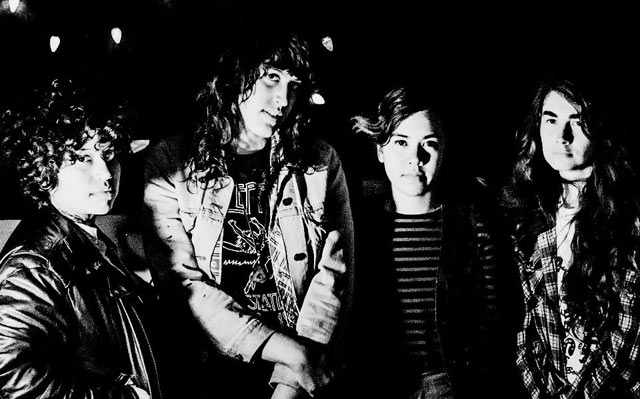Throughout June, I chatted with queer and trans artists of color about their work and their inspirations. Some are well known, others aren’t. But they’ve all got something to say about how the path toward liberation starts in the creative mind.
Despite its Jamaican roots, you don’t often think of people of color when you think of punk rock music. You certainly don’t think of a group of queer women of color playing this kind of music. But Queen Crescent, a new band based in Oakland, Calif., is out to change the perception of who can rock out. Composed of Andrea Genevieve (guitar, vocals), Amy Martinez (drums, percussion), Eni Loicy Pela (bass, vocals), and Melissa Vu (flute, vocals), the band sought to answer a question: What would it be like to put four women-of-color musicians obsessed with ’60s- and ’70s-‘era heavy rock ‘n’ roll in a room and have them start a band?
Their answer: Killer riffs and paradigm shifts, according to the Indiegogo campaign the band started to raise money for its debut album. "Rock ‘n’ roll is eternal. We make music how we want to hear it and we speak our truths without hesitation," the band members wrote. For the final installment of our queer artist series I talked to Queen Crescent member Andrea Genevieve about their formation, identity and creative vision.
Tell me about when you all started performing together.
I was in a band previous to this one called Purple Rhinestone Eagles and we were a three-piece. We were a band for a number of years inside of Portland and I became friends with the drummer, Amy Martinez, through her partner. …I hooked up with Amy and she said that she had this vision of starting a heavy rock band with all queer women of color. My band had just broken up and I thought, "I’d love to do it." I’d never been in a band with that intention of having people of these identities together and making music. We jammed and it was just immediate. She and I have this amazing connection. We recruited a couple other people and our current lineup is our strongest yet. We’ve been a band for about a year and a half, so we’re still pretty new. We’ve played a lot of really great shows.
How many folks are in your band right now?
Four of us. I sing and play guitar. I’m mixed race–my dad is black and my mom is white. Amy is Mexican; Melissa, our flute player, is Vietnamese and Columbian; and the bass player, Eni, is Nigerian.
Why was forming this group important to do?
Once again, it was Amy’s vision, but for me, I’ve been in lots of bands with lots of people with different identities. The four of us have different identities and class backgrounds [but] we just feel really comfortable with each other. There are things that we don’t have to explain; there are things that we all get. I do personally know a lot of POC and women and queer folks who are in music but aren’t represented in the larger music culture. We just really want to make a statement. And also, we all have really similar music interests in terms of the era we listen to and the type of music we want to play.
What would you say is the hardest thing about your craft?
The hardest thing is time. Especially living in the Bay, we all have jobs and obligations and finding time is a challenge. Also, we have so many identities in our band–queer, punk, rock ‘n’ roll–and one of the things that’s so fantastic about what we’re doing is that we can bring all of these identities together. But having multiple identities also means there’s not really one scene that we really fit into. I think that’s a strength, but it can also be difficult to navigate all that.
If you could talk to any queer icon from the past, who would it be and why?
I think the person that I would want to meet the most is Freddy Mercury. He was a gay man and a person of color and I would have so many questions for him as far as navigating all the spaces that he’d been in dating back to the ’60s and ’70s. I want to know what it was like for him as a person of color when his family moved to the U.K. and into a culture that was still relatively homogenous. I would love to geek out and get together with him.
